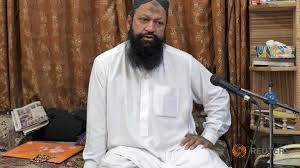Pakistani Police Kill Militant Group Leader
Pakistani authorities said Wednesday police killed the leader of a militant group accused of killing hundreds of Shi’ites.
Officers were transporting Malik Ishaq early Wednesday when the convoy came under attack by a group of men in Muzaffargarh.
Ishaq, his two sons and 11 others then died during a shootout with police. Six policemen were injured.
Ishaq operated freely for years in Pakistan as the country’s intelligence services helped nurture Sunni militant groups in the 1980s and 1990s to counter a perceived threat from neighboring Shiite power Iran.
Details of Ishaq’s killing remain cloudy in Pakistan, where extrajudicial slayings by police remain common – especially in pre-staged ambushes. Ishaq already had been detained by police, arrested two days earlier on suspicion of being involved in the slaying of two Shiites, police officer Bakhtiar Ahmed said.
Shuja Khanzada, the provincial home minister in Pakistan’s eastern Punjab province, where the alleged ambush took place, said the shooting wounded six police officers who “demonstrated extreme bravery.”
No other witnesses to the shooting could be immediately located, nor could Ishaq’s family members.
“Malik Ishaq was behind many acts of terrorism and he was freed by courts in the past due to lack of evidence,” Khanzada told The Associated Press. “Finally, this symbol of terror met his final fate.”
Ishaq was the leader of Lashkar-e-Jhangvi (LeJ), an al-Qaida linked group that has claimed responsibility for a number of attacks, including two bombings in Quetta in 2013 that killed nearly 200 people.
The U.S. State Department designated Ishaq a global terrorist last year, saying LeJ specialized in armed attacks and bombings and “admitted responsibility for numerous killings of Shia religious and civil society leaders in Pakistan.”
Ishaq was arrested in 1997 and accused in more than 200 criminal cases, including the killings of 70 Shiites. But the state could never make the charges stick – in large part because witnesses, judges and prosecutors were too scared to convict.
Frightened judges treated him honorably in court and gave him tea and cookies, said Anis Haider Naqvi, a prosecution witness in two cases against Ishaq who spoke to The Associated Press in 2011. One judge attempted to hide his face with his hands, but Ishaq made clear he knew his identity in a chilling way: He read out the names of his children, and the judge abandoned the trial, Naqvi said at the time.
Despite the lack of convictions, Ishaq remained in prison for 14 years as prosecutors slowly moved from one case to the next. Ishaq proved his usefulness to the army in 2009, when he was flown from jail to negotiate with militants who had stormed part of the military headquarters in Rawalpindi and were holding hostages
A behind-the-scenes effort by the government to co-opt the leaders of militant outfits and bring them into mainstream political life, or at least draw them away from attacking the state, helped Ishaq secure his release in 2011. He had been in and out of police custody since.
Pakistan is a majority Sunni Muslim state, with around 15 percent of the population Shiite. Most Sunnis and Shiites live together peacefully in Pakistan, though tensions have existed for decades and extremists on both sides target each other’s leaders.


